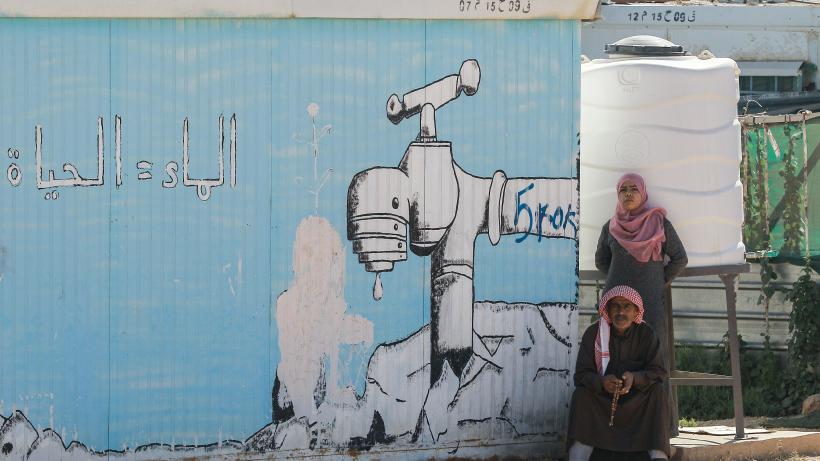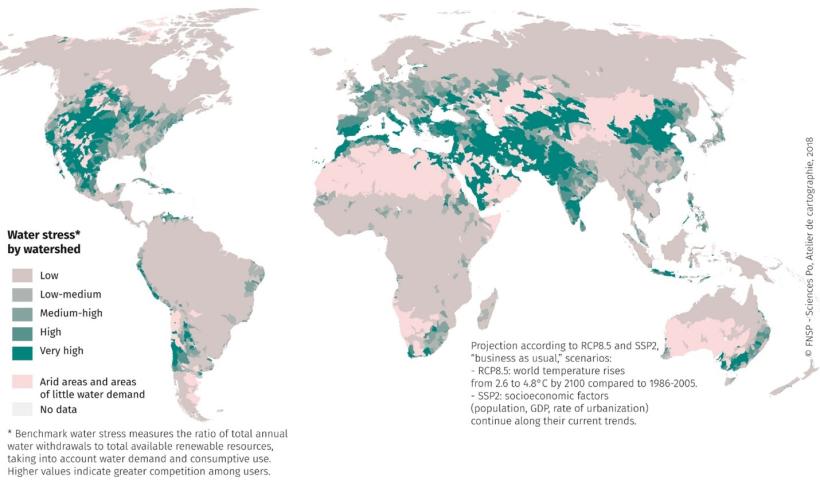
How religion can encourage women to conserve water in Jordan
Religion can be a catalyst for shaping women-led water conservation efforts in Jordan. A new study shows how religious messages by Islamic leaders can influence women’s religious beliefs and encourage water-saving practices.
The Middle East and North Africa (MENA) region faces the worst water scarcity in the world, with per capita water availability expected to fall by 50% by 2050. This heightened water insecurity could lead to negative socioeconomic and geopolitical consequences, including economic losses, social unrest, conflicts, and new waves of displacement, exacerbating existing challenges.
Within MENA, Jordan, the world's second most water-scarce country, faces a worsening water crisis. Factors such as climate change, rising demand driven by population growth (especially refugees), geopolitical tensions, and insufficient public policy efforts have diminished its per capita annual water share to 90.5 cubic meters, far below the UN "absolute water scarcity" threshold of 500 cubic meters.
Figure 1: Projected water stress in 2040 across the world

Notes: The MENA region faces the worst water scarcity in the world and Jordan is the world’s second most water-scarce country. Source: World Resources Institute
Addressing Jordan's water crisis calls for urgent behavioural changes among its citizens, especially women
Jordan’s water scarcity is largely a domestic issue, with household use making up 45% of total consumption. The population’s water demand is met by over-pumping the groundwater, which is used twice as quickly as it can be replenished. Interestingly, excessive household water use does not result from lack of awareness but rather from a lack of action. Indeed, 84% of citizens acknowledge the critical water shortage and 72% are aware of cost-effective water-saving methods. However, getting citizens to save water is challenging, as water preservation ranks last on Jordanians’ list of government spending priorities and water-saving practices rely on long-standing routines rather than responsive actions.
Innovative approaches are necessary to bridge this gap between knowledge and action and drive behavioural change at the household level. Since women are primarily responsible for household water management and daily water tasks, targeting them in water interventions is crucial.
Can religious messaging encourage women to adopt water-saving behaviours?
Islam gives special standing to water, emphasising water conservation as a core tenet of religious practice. Notably, 97.1% of the Jordanian population are Muslim, and approximately 40% attend mosque classes led by female preachers, waethats. Trusted female religious figures with privileged access to women have a unique opportunity to engage women in water policy.
An IGC study investigates the potential of religious messaging in shaping women’s water-saving behaviours. This involves 19 female religious leaders and 712 women attending classes at the mosque. Religious leaders hold two classes, randomised across treatment and control groups:
- Women in treated classes (treatment group) receive religious messaging emphasising that water preservation is a core prescription in Islam.
- Women in control classes (control group) receive religious messaging on a topic unrelated to water.
- Both groups of women receive non-religious, secular, information from the leader on Jordan’s water crisis and on water-saving methods.
This design investigates whether the content of the religious messaging fosters:
- Pro-sociality regarding water resources, measured by donations to water preservation charities
- Water conservation efforts, measured by household-level water consumption through water bills
The study finds that religious messaging increases water-saving attitudes among women.
- Women in the treatment group that received religious messaging stressing on water conservation prioritise water-saving in charity donations.
- These women are likely to donate 22% more money to charities and are 29% more likely to choose a water charity over other charities than the women in the control group who did not receive water-conservation religious messaging.
- Households of the women in the treatment group also substantially reduced water consumption by 4.6 cubic meters three months after the intervention – a cutback of 17% compared to the control group.
Importantly, this approach can be three times more effective than traditional interventions (for example solely providing households with general information on the water crisis). Results are driven by the power of religious messaging which changes women’s religious beliefs about water and prompts them to adopt more water-saving behaviours.
Implications for policy
In a region grappling with escalating water scarcity, the intersection of women’s inclusion and religious principles emerges as a promising area for water policy innovation. Building on the evidence presented here, Jordan and other MENA policymakers could consider:
- Targeting women in policy design because they oversee household water management. In the study, households' reduction in water consumption came from women’s behavioural adjustments – reducing the frequency and duration of water-intensive tasks and adopting water-efficient appliances. Further, as the treatment effect is largely driven by households with higher-than-average water usage, targeting women from those households is key to scaling up the intervention.
- Working with religious leaders in water policy design because of their influence over citizens. Religious actors can play a significant role in low-state-capacity contexts, in which the support of non-governmental institutions is vital for the success of public policies. In Islamic countries, this approach is also cost-effective as mosque-based programmes rely on a pre-existing infrastructure, teach a well-understood and well-developed set of values, and rely on religious agents that are trusted and respected by the local community.
- Providing religious leaders with communication training. The study shows that the success of this approach is influenced by religious leaders’ preaching style. Messaging should rely on well-established religious arguments to minimise potential resistance when promoting new practices. Content that clashes with longstanding practices and lacks a foundation in the established religious canon, such as the use of treated water for all purposes including religious ones, might receive resistance, especially among more conservative women. Messaging should also be delivered with a teaching style that aims to motivate rather than lecture.
- Complementing traditional approaches with innovative interventions to enhance impact. Water-sector interventions leveraging the influencing power of religion could be especially useful in contexts where traditional approaches alone face challenges, namely:
- Tariff reform is historically complex in Jordan and across the region as citizens tend to view water as a public good and display low willingness to pay and poor compliance with water bills. This is reflected in low, heavily subsidised public utility prices by global standards, with MENA citizens typically paying only around 35% of the production cost for water.
- Information campaigns might not be sufficient as Jordanian's awareness of the crisis and related sustainable practices does not always translate into action, as discussed above.
Therefore, traditional policies could be complemented with interventions that leverage Islam’s emphasis on water preservation. For instance, a new IGC project is exploring whether religious messaging emphasising Islamic water values could improve citizens' compliance with tariff increases.
- Testing the influencing role of religion in other areas of public policy. In countries where religion plays a significant role in citizens’ decisions such as Jordan, exploring how religion could target citizens’ beliefs and influence their behaviours around electricity use, health, credit payments, and waste management, represents a promising space for policy innovation and future research.

